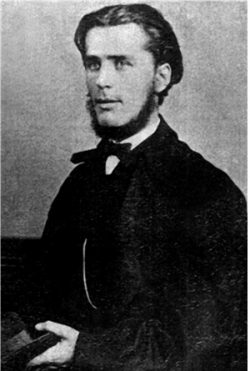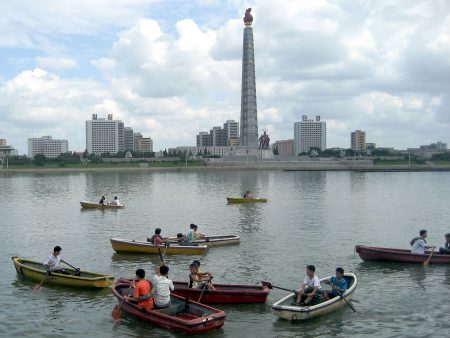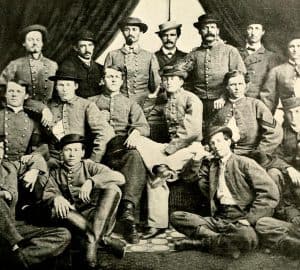
Robert Jermaine Thomas leaned on the rail of the ship to catch a glimpse of the land for which he had long labored and prayed. It was August of 1866. Through the haze of the summer heat, the young missionary could see the dark coastline of the land known to the west as “The Hermit Kingdom.” Although the ship upon which he rode was an American trading vessel, the General Sherman, Robert J. Thomas was neither an American nor was he a trader. He had come to give the good news of the everlasting Gospel to the people of Korea.
For many long centuries of history, “The Hermit Kingdom” on the isolated peninsula of Korea had resisted any western influence. Korean food, clothing, hair styles, and culture had remained unchanged as long as anyone could remember. Korean shamanism was the historic animistic religion of the Korean peninsula. This ethnic religion calls men to worship ancestors as well as the spirits of animals. Buddhist monks arrived in Korea in the 300s A.D., but Buddhism never gained complete mastery over the ancient ethnic animism. Confucianism and Taosim arrived in later centuries, but no religion ever dominated in the minds and hearts of the people of Korea.
Isolation, fear of outsiders, and loyalty to their own customs kept Christian missionaries at bay for a long time. In 1832, a German missionary named Karl Gutzlaff visited Korea with an armload of Chinese Bibles, hoping that some of the Bibles would fall into the hands of someone that could read them. Government officials demanded that he leave the country, and the German missionary wrote in his diary, “Can the divine truth, disseminated in Korea be lost? This I believe not; there will be some fruits in the appointed time of our Lord . . . The Scripture teaches us to believe that God can bless even these feeble beginnings. Let us hope that better days will soon dawn for Korea.” This prayer was answered in a remarkable way thirty years later when Robert Thomas arrived and sailed up the Tai Tong River near what is now Pyongyang.
Robert Jermaine Thomas was a faithful young Welsh missionary who had originally intended to spent his life serving in China. He and his wife, Caroline, had set sail for China under the direction of the London Missionary Society. After serving in China for several months, Robert and his wife learned that they were expecting their first child. Joy was turned quickly into sorrow when Caroline suffered a miscarriage. The blow was made all the heavier when Caroline died of complications from the miscarriage. Far from home and family, Robert Thomas resolved that he would not return to Wales, but stay where he was and serve the Lord anyway.
He had learned little bits and pieces of news and descriptions of “The Hermit Kingdom” of Korea. Roman Catholic priests had gained some converts in Korea in the 1700s, but their work blended Christianity with some of the animistic Korean superstitions. When news came in 1866 that the Korean government had killed 8,000 of these Catholic converts, Robert Thomas resolved that he would go and give the pure Gospel to the Korean people. Although he was warned of the dangers, he boldly sailed to the Korean peninsula to shine the Light of the World into a kingdom of darkness.
The American trading vessel on which he had secured passage was engaged in contraband trade. The Korean government had specifically forbidden foreign vessels to bring foreign goods into Korea. But many nations ignored this rule, and hoped to slip in undetected to sell cotton, tin, glass, fish hooks, glassware and other Western trade goods to the Koreans. Robert Thomas was interested only in the souls of the Koreans. Since he had learned a small bit of the Korean language as preparation, he was employed by the American Captain as a translator. As the American trader slipped up the river, Thomas distributed Chinese gospel tracts and Chinese Bibles to whoever would take them.
After several days of contraband trading, the ship came under the scrutiny of the Korean government. The officials sent notice to the American ship that it should desist trading and leave the kingdom immediately. When the ship ran aground on a hidden mud bank near Pyongyang, Korean government officials launched an attack on the stranded ship. The American crew fought off the attackers with cannon and small arms, and were able to hold out for two days.
Robert Thomas was deeply grieved at this turn of events. He had not come to kill Koreans but to save them. He had not come to take but to give. When the Koreans launched a burning vessel at the stranded American ship, a raging fire began to threaten the lives of all on board.
There are many different versions of the story of exactly how Robert Thomas died. Some say he was beaten to death after swimming to shore. Others say he succumbed to the searing heat of the flames. Others say he was stabbed to death by a Korean soldier. But all accounts agree on one point, Robert Thomas gave his life willingly in an effort to give the people of Korea the Word of God. In the widely accepted account of his last moments, Robert Jermaine Thomas waded to shore with his clothes on fire, holding in his hands the few precious Bible he had left, offering them to the Korean people on the shore. He shouted the name, “Jesus! Jesus!” and offered his last Bible to the Korean that killed him. After a few moments of pain and suffering, Robert Jermaine Thomas was reunited with his wife and baby in the presence of the Lord Jesus.
The Korean officials, soldiers, and civilians looted the bodies of the slain and carried off all they could. In the Providence of God, one of the Korean officials took home one of the Bibles and used the pages to “wallpaper” the interior walls of his home. Before long, local residents came to this official’s home to read his remarkable wallpaper.
The Word of God did not return void. Other missionaries followed Thomas, and within forty years of his death, over a hundred churches flourished in the Korean Peninsula. In 1907, a remarkable awakening called “The Korean Pentecost” brought an overwhelming movement of the Holy Spirit that ignited an interest in Christianity that still continues today in Korea. While parts of Korea are still closed to the Gospel, we must hope and pray that the Lord will finish in Korea the mighty work He has begun.
Bibliography
The Korean Pentecost and The Sufferings Which Followed by William Blair and Bruce Hunt





